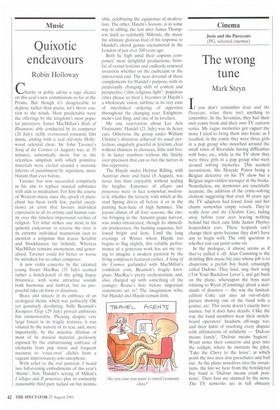Quixotic endeavours
Robin Holloway
Charity or polity advise a sage silence on this year's new commissions so far at the Proms. But though it's disagreeable to deplore rather than praise, let's throw caution to the winds. Most predictable were the offerings by the kingdom's most popular purveyors. James MacMillan's Birds of Rhiannon, ably conducted by its composer (26 July): richly overscored romantic film music, ending with a real old-style Hollywood celestial choir. Sir John Tavener's Song of the Cosmos (4 August) was, at 35 minutes, unwontedly short, but in the relentless simplism with which primitive materials were circled around a moronic inferno of punishment by repetition, more blatant than ever before.
Tavener has now succeeded completely in his aim to replace musical substance with aids to meditation. For him the course of Western music since the epoch of plainchant has been (with few, partial exceptions) an error that favours individual expression in all its artistic and human vanity over the timeless impersonal verities of religion. Yet what strikes one most in his quixotic endeavour to reverse the river is its extreme individual mannerism (not to mention a solipsism that leaves Scriabin and Stockhausen far behind). Whereas MacMillan remains anonymous and generalised. Tavener could for better or worse be mistaken for no other composer.
A new violin concerto by the talented young Stuart MacRae (31 July) seemed rather a hotch-potch of the going lingua britannica, with some attractive sounds both harmonic and timbral, but no purposeful take on form or direction.
Brave and sincere in its embrace of an ecological theme which was politically OK yet genuinely desolating, Sally Beamish's Knotgrass Elegy (29 July) proved ambitious but unmemorable. Pleasing despite very large forces in its fragile textures, it was vitiated by the naivety of its text, and, more importantly, by the anaemic dilution of most of its musical material, perilously exposed by the embarrassing embrace of elements from pop music and frequent recourse to 'voice-over' clichés from a vagrant improvisatory solo saxophone.
With relief to the real pastoral. I heard two full-evening embodiments of this year's 'theme'; first, Handel's setting of Milton's L'allegro and 11 penseroso plus its eminently reasonable third part, tacked on but inomis
sible, celebrating the equipoises of moderation. The other, Haydn's Seasons, is in some way its sibling, the text after James Thompson itself so redolantly Miltonic, the music the ultimate glorious fruit of his response to Handel's choral genius encountered in the London of just over 200 years ago.
Both lie high amid their copious composers' most delightful productions, brimful of vernal lyricism and endlessly renewed invention whether on the exuberant or the introverted end. The neat dovetail of these complements for Handel's purpose, with its perpetually changing shift of context and perspective ('dim religious light'/ 'populous cities please us then'), becomes in Haydn's a wholescale vision, sublime in its very ease of interlinked ordering of opposites throughout the changing year. Enlightenment's last fling, and one of its loveliest.
My one reservation about Les Arts Florissants' Handel (21 July) was its heavy cuts. Otherwise the group under William Christie's direction achieved its usual perfection, singularly graceful in lyricism, clear without thinness in choruses, lithe and lively in faster numbers without the finicky over-precision that can so fret the nerves in this repertoire.
The Haydn under Helmut Rilling, with Austrian choir and band (8 August), was never less than enjoyable without scaling the heights. Extremes of allegro and penseroso were in fact somewhat moderato'd, whether the ferocity with which at the start Spring drives all before it or in the panting heat-haze of high Summer. The joyous climax of all four seasons, the chorus bringing in the Autumn grape harvest, was under-intoxicated, though its immediate predecessor, the hunting sequence, bellowed bright and lusty. Until the long evenings of Winter where Haydn too begins to flag slightly, this reliable performance of a generous work has set me trying to imagine a modern pastoral by the living composers featured earlier. A Song of the Cosmos garlanded with MacMillan's confident corn. Beamish's fragile knotgrass, MacRae's pretty orchestration; and, also, charged up with something of the younger Rouse's brio before important statements set in? The imagination wilts; but Handel and Haydn remain firm.


























































 Previous page
Previous page